Mbeki vs Zuma vs Ramaphosa: How the ANC's electoral dominance eroded under each president
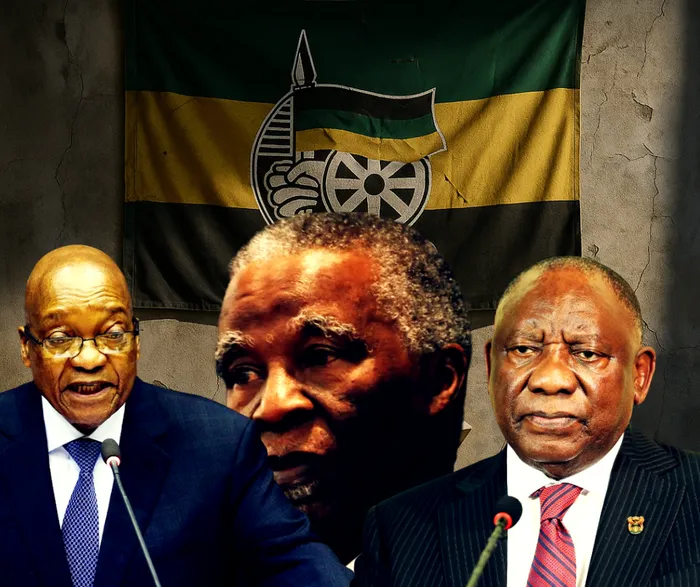
The African National Congress has experienced a significant decline in electoral support since the end of the Mandela era, facing challenges under the leadership of Thabo Mbeki, Jacob Zuma, and Cyril Ramaphosa - contributing to the ANC's diminishing influence in South African politics.
Image: IOL graphics / Sora AI
The African National Congress (ANC), once the unwavering liberation movement and governing party, has seen its electoral dominance erode across national and local politics in the post-Mandela era.
The party's support grew under the presidency of Thabo Mbeki but fluctuated under Jacob Zuma, before rapidly declining under Cyril Ramaphosa. The downward trend has grown sharper in recent years, culminating in a disappointing showing for Ramaphosa in the last national elections - where the party managed just 40% of the national vote.
During Mbeki’s presidency (1999-2008), the ANC enjoyed strong national and local support, marking a high-water mark in the party’s post-apartheid dominance.
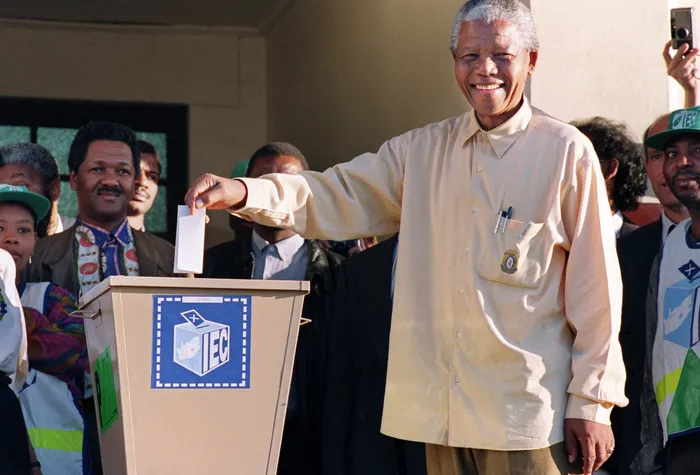
ANC president Nelson Mandela smiles on April 27, 1994, as he casts his first vote at the polling station at John Langalibalele Dube’s Ohlange High School in Inanda, near Durban, in South Africa’s first democratic general elections. On his right is former minister Jeff Radebe. This week, people who witnessed Madiba’s vote 30 years ago and Dube’s descendants were first in line at the same polling station to make their mark. |
Image: WALTER DHLADHLA AFP
In the 1999 general election, the ANC won about 66.4% of the national vote, securing a decisive majority in the National Assembly.
In 2004, Voice Of America News highlighted what it described as the ANC’s most significant victory, the party won around 70% of the national vote. It secured more than two-thirds of seats in parliament, enabling constitutional amendments.
Under Mbeki, the party won key municipalities and metropolitan areas in local government elections, maintaining dominance across major urban centers.
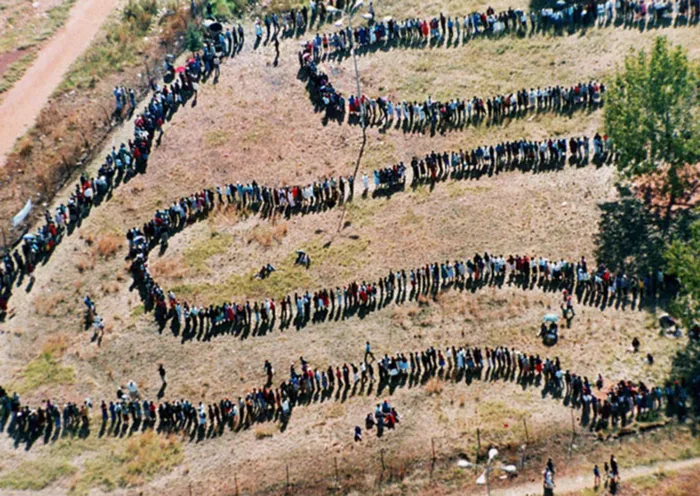
The African National Congress (ANC), once the unwavering liberation movement and governing party, has seen its electoral dominance erode across national and local politics in the post-Mandela era.
Image: Independent Media
An April 2020 Inter-Parliamentary report noted that the ANC’s national support peaked in the 2004 elections (around 69.7%), before gradually declining in subsequent polls under Zuma and Ramaphosa.
Zuma’s presidency (2008-2018) coincided with renewed internal tensions, corruption allegations, and strategic shifts within the party, reflecting dwindling electoral margins and shifting allegiances at the local level.
The 2019 elections (the first national vote after Zuma’s tenure and Mbeki's recall) marked a notable drop below 60% for the ANC in a national election, a historic low in the post-apartheid period.
Local elections during and after Zuma’s era also showed volatility as metros and municipalities swung toward opposition coalitions, signalling a fracture in the ANC’s traditional urban strongholds.
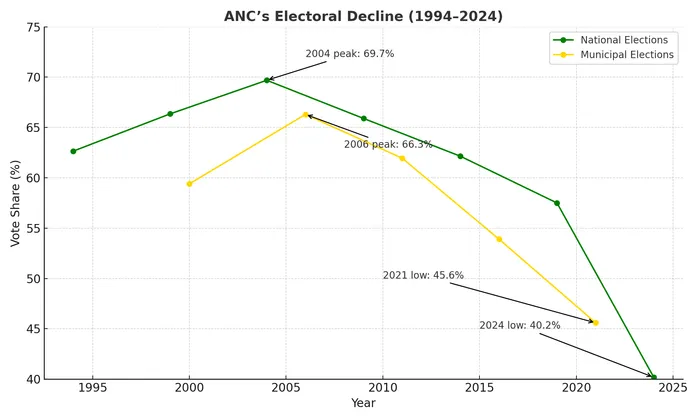
A chart showing the ANC's electoral decline since 1994.
Image: IOL
In a 2020 study titled ‘Zuma versus Ramaphosa: Factors Influencing Party Choice of South Africans in the run-up to the 2019 Elections’, published by Yolanda Sadie and Leila Patel, the 2019 elections were described as the period in which the ANC’s early dominance had waned as the party faced new challenges and dissidents forming splinter groups such as COPE and the EFF.
International media at the time highlighted how Zuma’s controversial presidency and internal factionalism contributed to weaker electoral support and increasing fragmentation.
The BBC reported on August 6, 2016, that in the Tshwane metro, the DA surged ahead in some wards, illustrating urban-voter shifts that further diluted the ANC’s traditional strongholds.
In Johannesburg, while the ANC won in the city, it did not secure an outright majority, underscoring broader challenges in retaining metropolitan dominance.
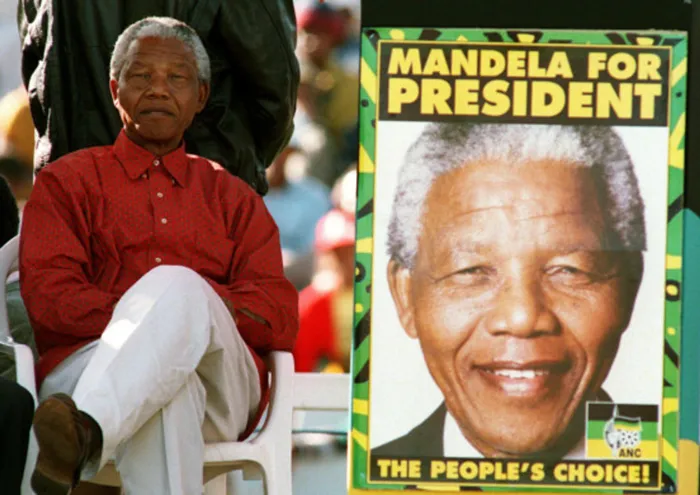
(FILES) African Nation Congress (ANC) President Nelson Mandela, seated next to an election campaign poster, three days ahead of South Africa's 1994 elections. (FILES) African Nation Congress (ANC) President Nelson Mandela, seated next to an election campaign poster, three days ahead of South Africa's 1994 elections.
Image: Indepedent Media
However, Ramaphosa’s tenure (2018-present) has been marked by a continuing slide in national and local polls.
In the 2019 national election, Ramaphosa’s ANC saw its vote share dip below 60% for the first time in the post-apartheid era. This was accompanied by losing 19 parliamentary seats from the previous term.
The 2024 elections did not spare the party, delivering a historic setback.
"The ANC polled 40.2% of the national vote, marking a sharp decline from 2019 and falling well short of the party’s aspirational target of 45%.
According to the IEC, voter turnout in 2024 was 58.6%, lower than in prior elections, signalling growing disengagement.
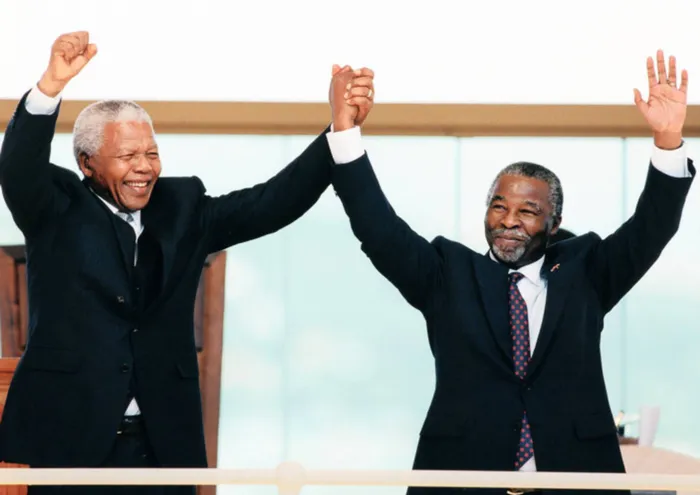
Nelson Mandela and Thabo Mbeki at the latter's inauguration as president of South Africa in 1999.
Image: Debbie Yazbek
In several municipalities, the City of Johannesburg, Tshwane, Ekurhuleni, and Nelson Mandela Bay have moved toward coalition governance rather than single-party control.
A Friedrich Naumann Foundation analysis published May 3, 2024, framed the period as illustrating a bitter power struggle between Zuma and Ramaphosa, and highlighted the broader political pivot in South Africa’s landscape, including ongoing corruption challenges and pressures on governance.
Zakhele Ndlovu, a University of KwaZulu-Natal political analyst, called all three presidents “disastrous” in different respects, arguing that corruption worsened under Zuma and Ramaphosa, while acknowledging service delivery failures by the party.
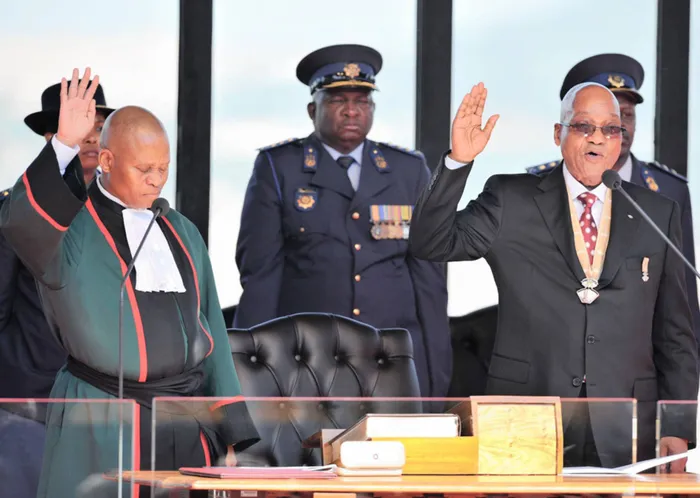
Presidential Inauguration of President Jacob Zuma for his second term by Chief Justice, Mogoeng Mogoeng at the Union Buildings in Pretoria. Picture: Antoine de Ras, 24/05/2014 - POOL Presidential Inauguration of President Jacob Zuma for his second term by Chief Justice, Mogoeng Mogoeng at the Union Buildings in Pretoria. Picture: Antoine de Ras, 24/05/2014 - POOL
Image: Independent Media
“Since the ANC came into power, standards have dropped significantly. Mbeki takes the most blame for the health situation because his administration refuses to provide ARVs, and people are dying prematurely.
“The only reason Mbeki is perceived to have been a better leader is that generally, the ANC has not done much development for the country.”
Ndlovu also criticised perceived patronage and the appointment of family members and close allies in executive roles by both the Mbeki and Zuma administrations.
Independent Political analyst Joe Mhlanga said the ANC's inability to garner support was due to a lack of service delivery and internal infighting.
“The opposition’s coalitions found fertile ground as the ANC’s internal fractures widened; COPE and the EFF emerged as competitive alternatives rather than fringe voices.”
He argued that all three presidents failed to give what they promised their supporters.
“ANC supporters are mainly black people; these are the same people who have been promised land and jobs, but what they got instead are reports of corruption, nepotism, and a total disregard for the law.
ANC national spokesperson Mahlengi Bhengu-Motsiri did not respond to questions from IOL.
thabo.makwakwa@inl.co.za
IOL Politics
Related Topics: